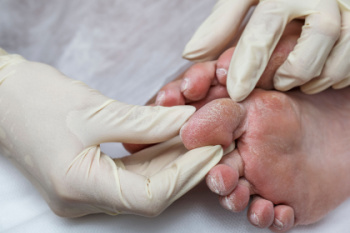 Diabetic foot ulcers and peripheral neuropathy are common complications of diabetes, often resulting in significant pain and discomfort. Neuropathy, caused by prolonged high blood sugar levels, damages the nerves, leading to numbness, tingling, and pain in the feet. Ulcers develop due to reduced blood flow and the inability to sense injuries, allowing minor wounds to progress into serious infections. Assessment involves a thorough examination of the feet, checking for signs of neuropathy, poor circulation, and existing ulcers. Podiatrists use tools like monofilaments to test sensation and Doppler devices to assess blood flow. Management focuses on controlling blood sugar levels, proper wound care, and preventing further complications. Pain from neuropathy is treated with medications, while ulcers require cleaning, debridement, and specialized dressings. Custom orthotics and appropriate footwear can alleviate pressure on affected areas. If you suffer from diabetic-related foot problems, it is suggested that you are under the care of a podiatrist for optimal care.
Diabetic foot ulcers and peripheral neuropathy are common complications of diabetes, often resulting in significant pain and discomfort. Neuropathy, caused by prolonged high blood sugar levels, damages the nerves, leading to numbness, tingling, and pain in the feet. Ulcers develop due to reduced blood flow and the inability to sense injuries, allowing minor wounds to progress into serious infections. Assessment involves a thorough examination of the feet, checking for signs of neuropathy, poor circulation, and existing ulcers. Podiatrists use tools like monofilaments to test sensation and Doppler devices to assess blood flow. Management focuses on controlling blood sugar levels, proper wound care, and preventing further complications. Pain from neuropathy is treated with medications, while ulcers require cleaning, debridement, and specialized dressings. Custom orthotics and appropriate footwear can alleviate pressure on affected areas. If you suffer from diabetic-related foot problems, it is suggested that you are under the care of a podiatrist for optimal care.
Wound care is an important part in dealing with diabetes. If you have diabetes and a foot wound or would like more information about wound care for diabetics, consult with one of our podiatrists from Nassau Foot & Ankle. Our doctors will assess your condition and provide you with quality foot and ankle treatment.
What Is Wound Care?
Wound care is the practice of taking proper care of a wound. This can range from the smallest to the largest of wounds. While everyone can benefit from proper wound care, it is much more important for diabetics. Diabetics often suffer from poor blood circulation which causes wounds to heal much slower than they would in a non-diabetic.
What Is the Importance of Wound Care?
While it may not seem apparent with small ulcers on the foot, for diabetics, any size ulcer can become infected. Diabetics often also suffer from neuropathy, or nerve loss. This means they might not even feel when they have an ulcer on their foot. If the wound becomes severely infected, amputation may be necessary. Therefore, it is of the upmost importance to properly care for any and all foot wounds.
How to Care for Wounds
The best way to care for foot wounds is to prevent them. For diabetics, this means daily inspections of the feet for any signs of abnormalities or ulcers. It is also recommended to see a podiatrist several times a year for a foot inspection. If you do have an ulcer, run the wound under water to clear dirt from the wound; then apply antibiotic ointment to the wound and cover with a bandage. Bandages should be changed daily and keeping pressure off the wound is smart. It is advised to see a podiatrist, who can keep an eye on it.
If you have any questions, please feel free to contact our offices located in Oceanside, Franklin Square, and East Norwich, NY . We offer the newest diagnostic and treatment technologies for all your foot care needs.
